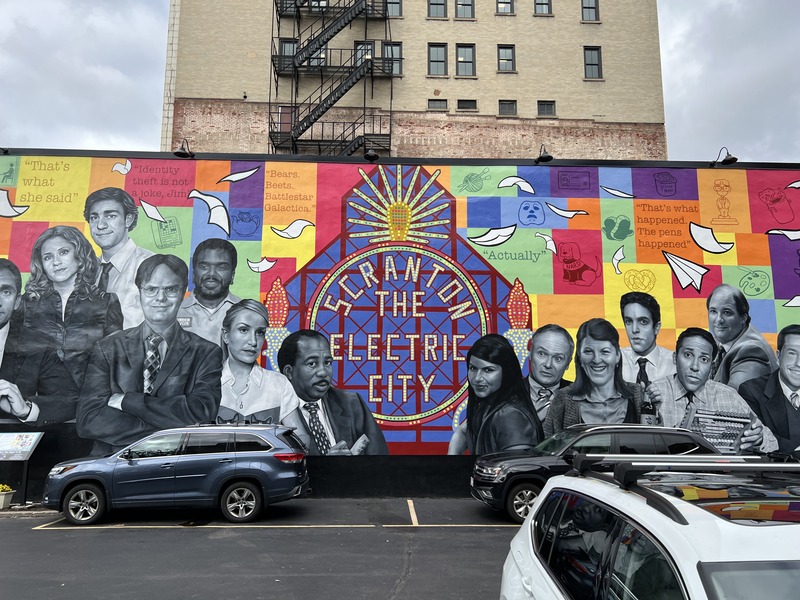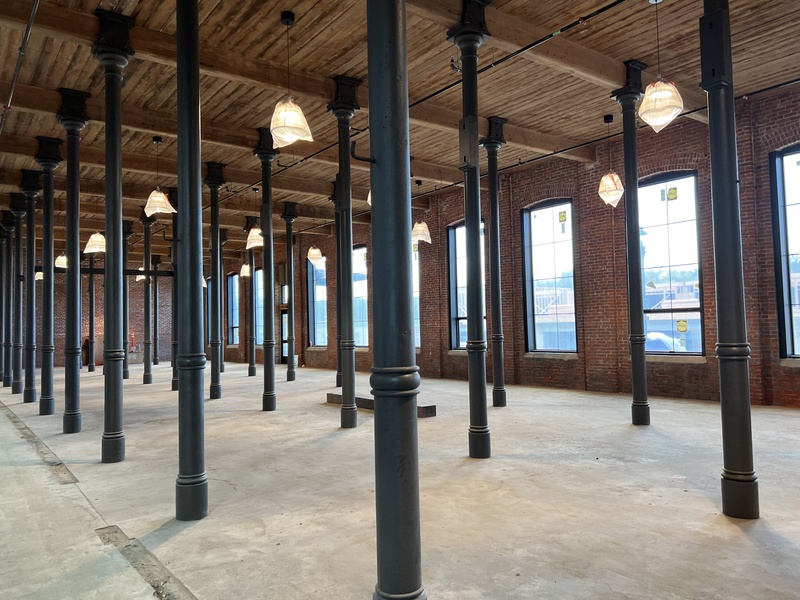Land Matters Podcast: Paige Cognetti and the Reinvention of Scranton

What comes to mind upon hearing Scranton, Pennsylvania? For some, it’s the location of the fictional company Dunder Mifflin, from the TV comedy series “The Office.” Others may know it as President Biden’s hometown. Hard-core urbanists will note that it’s also where Jane Jacobs grew up, before moving to New York City to do battle with Robert Moses.
Ultimately, though, much of what Scranton is about these days is what legacy cities are confronting across the US and indeed all over the world: its postindustrial future, now that the manufacturing industries of yesteryear are long gone.
In the case of Scranton, a railroad crossroads in northeast Pennsylvania, its industrial riches were built on mining and processing coal, as well as iron and steel and textiles, and a heyday of some of the nation’s first electric lights and electrified streetcars, which earned it the moniker the “Electric City.” Though some defense-related manufacturing remains, the city is facing a new frontier. Essentially, Scranton must reinvent itself as a metropolis that was built, beginning more than a century ago, for purposes that no longer exist.

Into this moment comes Paige Gebhardt Cognetti, a transplant from Oregon with an MBA and a stint in the Treasury Department during the Obama administration, to help try to forge a way forward. The 43-year-old mother of two was sworn in January 2020 after the previous chief executive resigned and pleaded guilty to corruption charges. She won reelection to a full term in November 2021, and is the first woman to hold the office.
“The Scranton story now is one, I think, of resilience and creativity,” Cognetti said in an interview for the Land Matters podcast. The establishment of the coal and textile industries “really set the tone for the type of entrepreneurship that we are still known for and that we’re looking to have more of in Scranton.”
Earlier generations recognized that local economy needed to be diversified, she said, so the city wasn’t tied to an anchor industry that would inevitably diminish. As a result, the city has “lots of educational institutions, we have hospitals, we have healthcare, we have services. We also still have 11 percent of our jobs that are based in manufacturing. . . . There’s a lot of different family-owned, smaller businesses. That’s really important for our economy.”
The efforts at reinvention are readily seen in projects such as Boomerang Park, site of a former gas plant, and in the transformation of the Scranton Lace Factory, which once employed thousands of people churning out curtains, tablecloths, parachutes, and camouflage netting before closing in 2002. The abandoned campus of red-brick factory buildings is now being turned into a mixed-use project with offices, homes, retail spaces, and event venues.

Those kinds of adaptive reuse projects are “unique and really catching people’s attention, so folks want to be there,” Cognetti said. “That’s something that I think we can replicate.”
She has been bullish on Scranton since she went there nearly 20 years ago and ordered a sandwich at a restaurant run by her future husband. She had grown up in Beaverton, Oregon, and graduated from the University of Oregon Clark Honors College with a BA in English literature; she ended up in Pennsylvania working for political campaigns including Barack Obama’s first run for President. She became a senior advisor to the Under Secretary for International Affairs at the US Treasury Department, was an investment advisor in New York City, and earned an MBA at Harvard Business School as well.
Before becoming mayor, Cognetti advised the Pennsylvania Auditor General on oversight of public school districts and care for older adults, and served on the Scranton School Board.
You can listen to the show and subscribe to Land Matters on Apple Podcasts, Google Podcasts, Spotify, Stitcher, or wherever you listen to podcasts.
This interview will be available online and in print in Land Lines magazine, as the latest installment in the Mayor’s Desk series. The first 20 Q&As with mayors from around the world have been compiled in a new book, with an introduction by former New York City Mayor Mike Bloomberg.
Further Reading
Now the mayor of Scranton, PA, Paige Gebhardt Cognetti's passion for equity inspired by her time in CHC (University of Oregon Clark Honors College)
Scranton Elects First Female Mayor by Overwhelming Margin (Penn Live)
America’s Legacy Cities: Building an Equitable Renaissance (Lincoln Institute of Land Policy)
Remaking Local Economies (Lincoln Institute of Land Policy)
How Small and Midsize Legacy Cities Can Pursue Equitable, Comprehensive “Greening” (Lincoln Institute of Land Policy)
Anthony Flint is a senior fellow at the Lincoln Institute of Land Policy, host of the Land Matters podcast, and a contributing editor of Land Lines.
Lead image: Paige Cognetti. Credit: Courtesy photo.